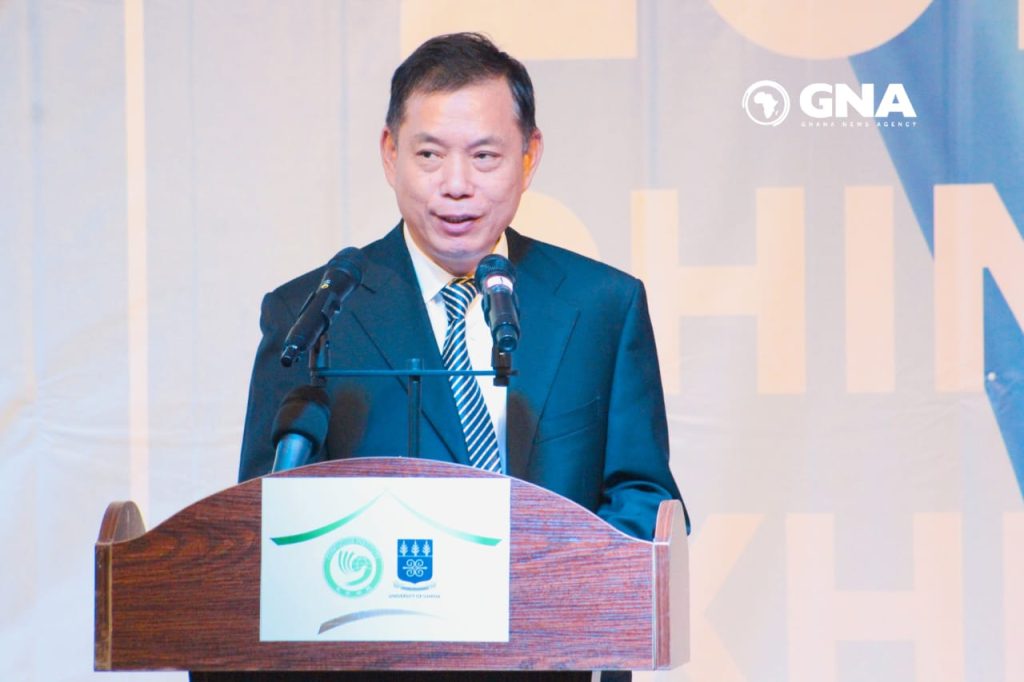By Iddi Yire, GNA
Legon, Oct 12, GNA – Mr Sheng Jianxue, Secretary-General of the China Scholarship Council, says China and Ghana must deepen cooperation in the educational sector.
He said the Council would endeavour to promote the achievements of Chinese higher education, introducing the latest policy and scholarship opportunities on study in China to attract more outstanding young Ghanaian students and scholars to study in China.
Mr Sheng said this in his address at the opening of an exhibition held by a Chinese delegation of 24 top universities, at the Confucius Institute of the University of Ghana, Legon.
Mr Lu Kun, the Chinese Ambassador to Ghana, opened the Exhibition, which seeks to attract more Ghanaian students for admission into Chinese universities.

The event was organised by the China Scholarship Council in collaboration with the Chinese Embassy in Accra, Ghana’s Ministry of Education and the Confucius Institute of the University of Ghana.
Mr Sheng said the Accra exhibition would deepen their collaboration with Ghanaian universities; thus contributing to the Belt and Road Initiative, and building a China-Africa community of shared future together.
He noted that currently, China had built a higher education system with a complete range of disciplines on highly competitive global standards.
“China higher education has entered a world-recognized popular stage, with a gross enrollment rate of 60 per cent, 30 percentage points than a decade ago,” he stated.
According to the 2023 Nature Index Ranking, China becomes the Top 1 in natural sciences research quality for the first time, and remains the world’s No.1 in the quantity of scientific papers on high-level international journals and No.2 highest cited papers.
Mr Sheng said Chinese university on the world’s Top 100 list rose from two a decade ago to seven; adding that at the same time, China had been strengthening educational cooperation and exchanging with the rest of the world.
He said remarkable achievements were observed in promoting the mobility of Chinese and foreign students and scholars.
He said in 2022, more than 800 thousand Chinese students study abroad, maintaining the world’s biggest source country.
Mr Sheng said with China’s growing influence in international affairs, China had become one of the most attractive destinations for study abroad.
China received the first Ghanaian student in 1960 and over the past decade, 2,012 Ghanaian students were sponsored under the Chinese Government Scholarship, he noted.
Among them were 714 doctoral students, constituting 35 per cent, while graduate students were 1,090, constituting 54 per cent.
With regard to the academic years of 2021 to 2022, Mr Sheng said a total number of 4,600 Ghanaian students study in China; explaining that iinnovative young people were the solid drive of human development.
He said the China Scholarship Council was willing to use the Accra exhibition as a platform of educational exchange, strengthen the connectivity between China and Ghana higher education field.
Thus consolidating cooperation between the universities and supporting the two-way flow for their students and scholars and promoting extensive exchange and mutual learning.
On his part, Ambassador Lu said the Accra exhibition sought to offer prospective students the opportunity to apply for scholarships to study in China, and become envoys of cultural exchanges and promote friendship between the two peoples.
He said China welcomed talented Ghanaian students to study in Chinese universities, experience China’s development, learn Chinese culture and make Chinese friends.
Dr Yaw Osei Adutwum, Ghana’s Minister of Education, lauded China for positioning itself as a global leader in higher education.
Professor Nana Aba Appiah Amfo, Vice-Chancellor, University of Ghana, in a speech read on her behalf, said the establishment of the first Confucius Institute in Ghana in 2013, which started operations in 2014, had improved the opportunities for students in their undergraduate Chinese programme and others outside their programme to learn Chinese language and Culture.
“Thus, more of our students are getting to study in China with varying levels of support from the China Scholarship Council as well as host universities,” she said.
The Vice Chancellor also appealed to China for more scholarship opportunities for more Ghanaian students to enhance educational and cultural exchanges between the two countries.




GNA